Unit 3 Could you please tell me where the restrooms are Section B (2a-2d)课件(共18张PPT)
文档属性
| 名称 | Unit 3 Could you please tell me where the restrooms are Section B (2a-2d)课件(共18张PPT) | 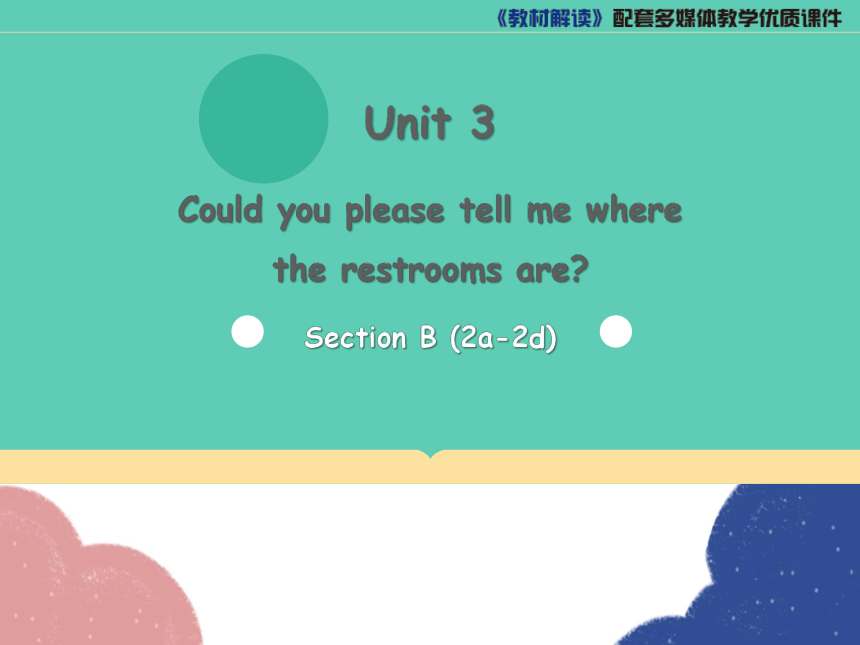 | |
| 格式 | zip | ||
| 文件大小 | 740.3KB | ||
| 资源类型 | 教案 | ||
| 版本资源 | 人教新目标(Go for it)版 | ||
| 科目 | 英语 | ||
| 更新时间 | 2022-12-10 09:00:52 | ||
图片预览

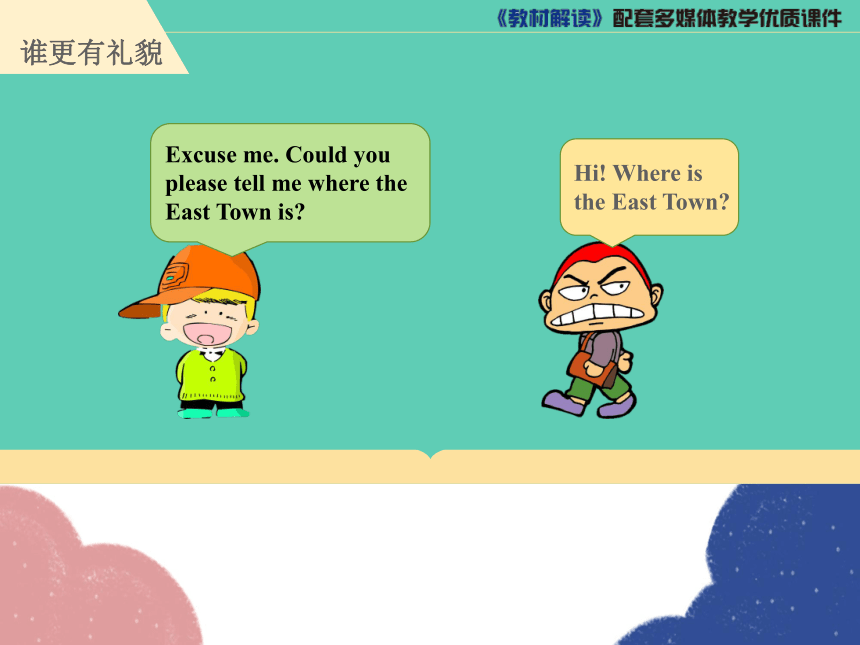
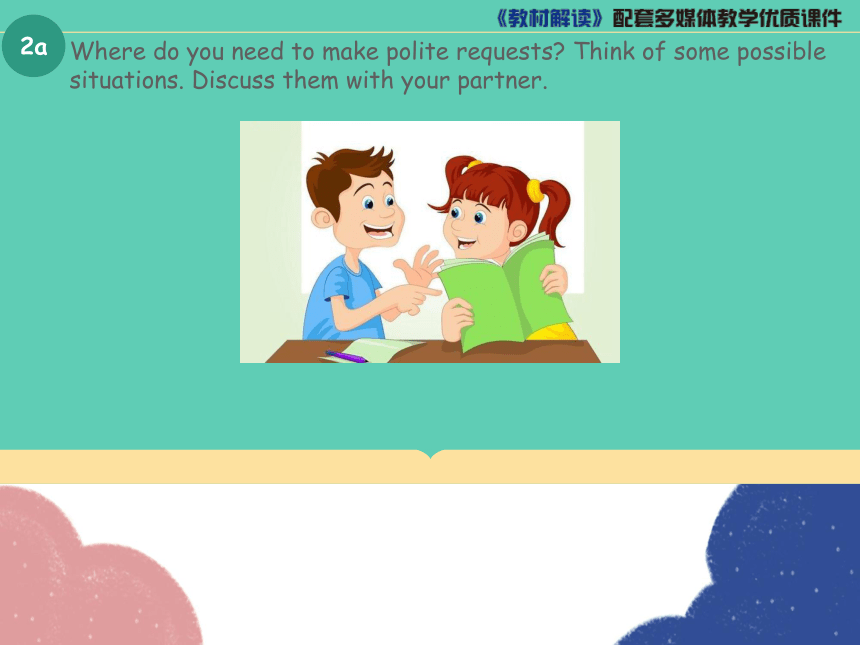
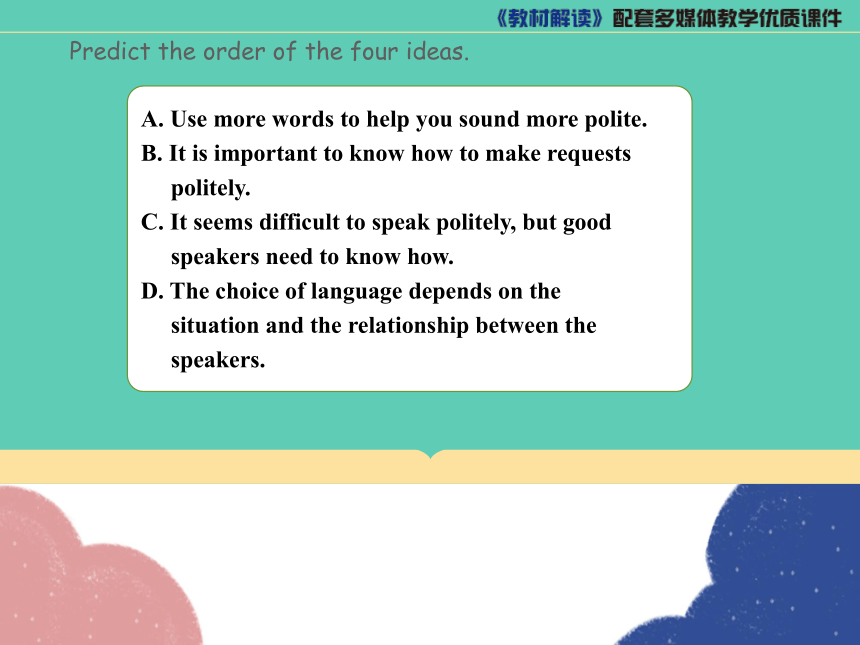
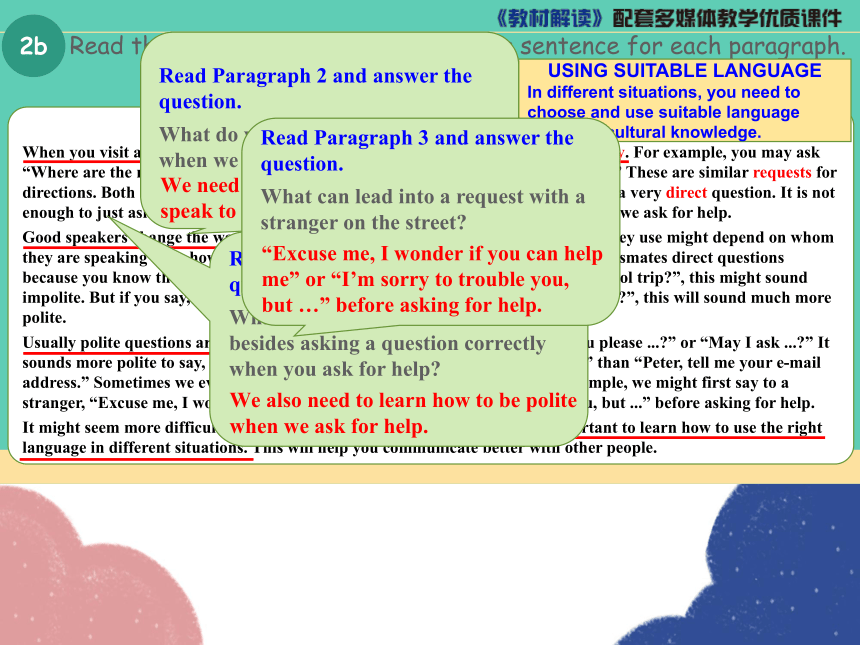
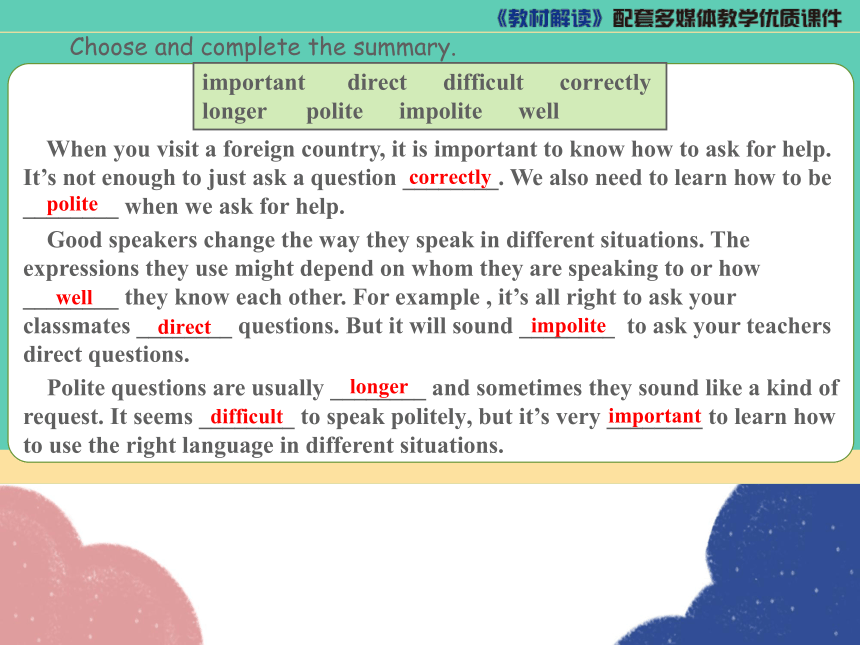
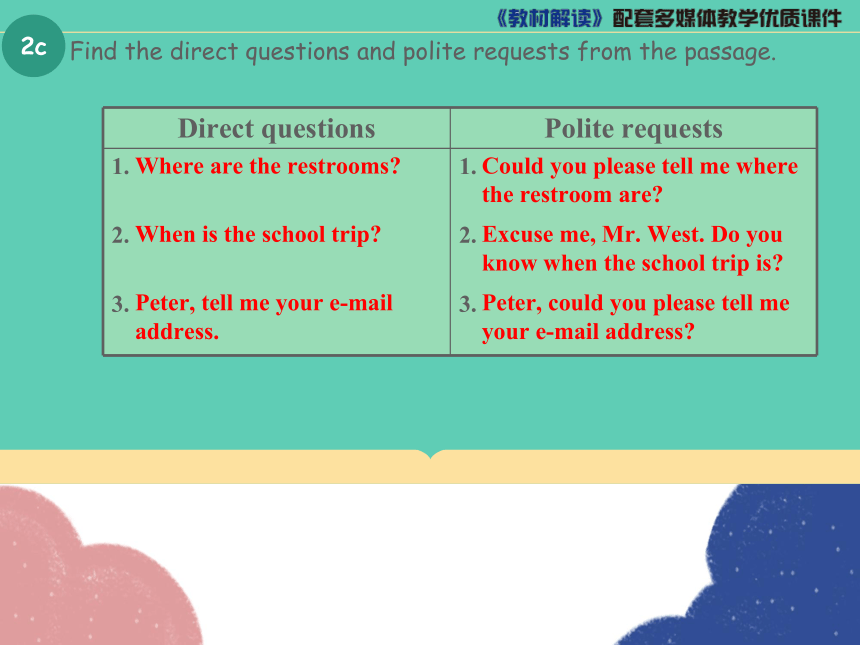
文档简介
(共18张PPT)
Unit 3
Could you please tell me where the restrooms are
Section B (2a-2d)
谁更有礼貌
Hi! Where is the East Town
Excuse me. Could you please tell me where the East Town is
2a
Where do you need to make polite requests Think of some possible situations. Discuss them with your partner.
Predict the order of the four ideas.
A. Use more words to help you sound more polite.
B. It is important to know how to make requests
politely.
C. It seems difficult to speak politely, but good
speakers need to know how.
D. The choice of language depends on the
situation and the relationship between the
speakers.
2b
Read the article and underline the topic sentence for each paragraph.
Could You Please ...
When you visit a foreign country, it is important to know how to ask for help politely. For example, you may ask “Where are the restrooms ” or “Could you please tell me where the restrooms are ” These are similar requests for directions. Both are correct, but the first one sounds less polite. That is because it is a very direct question. It is not enough to just ask a question correctly. We also need to learn how to be polite when we ask for help.
Good speakers change the way they speak in different situations. The expressions they use might depend on whom they are speaking to or how well they know each other. It is all right to ask your classmates direct questions because you know them well. However, if you say to your teacher, “When is the school trip ”, this might sound impolite. But if you say, “Excuse me, Mr. West. Do you know when the school trip is ”, this will sound much more polite.
Usually polite questions are longer. They include expressions such as “Could you please ... ” or “May I ask ... ” It sounds more polite to say, “Peter, could you please tell me your e-mail address ” than “Peter, tell me your e-mail address.” Sometimes we even need to spend time leading into a request. For example, we might first say to a stranger, “Excuse me, I wonder if you can help me” or “I’m sorry to trouble you, but ...” before asking for help.
It might seem more difficult to speak politely than directly. However, it is important to learn how to use the right language in different situations. This will help you communicate better with other people.
USING SUITABLE LANGUAGE
In different situations, you need to choose and use suitable language based on cultural knowledge.
Read Paragraph 1 and answer the question.
What else do we need to learn besides asking a question correctly when you ask for help
We also need to learn how to be polite when we ask for help.
Read Paragraph 2 and answer the question.
What do we need to think about when we talk to different people
We need to think about whom we speak to or how well we know them.
Read Paragraph 3 and answer the question.
What can lead into a request with a stranger on the street
“Excuse me, I wonder if you can help me” or “I’m sorry to trouble you, but …” before asking for help.
Choose and complete the summary.
When you visit a foreign country, it is important to know how to ask for help. It’s not enough to just ask a question ________. We also need to learn how to be ________ when we ask for help.
Good speakers change the way they speak in different situations. The expressions they use might depend on whom they are speaking to or how ________ they know each other. For example , it’s all right to ask your classmates ________ questions. But it will sound ________ to ask your teachers direct questions.
Polite questions are usually ________ and sometimes they sound like a kind of request. It seems ________ to speak politely, but it’s very ________ to learn how to use the right language in different situations.
important direct difficult correctly
longer polite impolite well
correctly
important
difficult
longer
impolite
direct
well
polite
2c
Find the direct questions and polite requests from the passage.
Direct questions Polite requests
1. 2. 3. 1.
2.
3.
Where are the restrooms
When is the school trip
Peter, could you please tell me your e-mail address
Peter, tell me your e-mail address.
Excuse me, Mr. West. Do you know when the school trip is
Could you please tell me where the restroom are
2d
Read the requests below. In the second column, write A if you would say it to someone you know and B if you would say it to a stranger. In the last column, write where you think these people are.
Request Person Place
1. Will you pass the salt
2. Do you know where I can change some money, please
3. Could you tell me what just happened
4. Can you please tell me where the nearest station is
5. Excuse me, do you know what time it begins, please
6. Let me know when you’re ready, OK
7. Could you possibly tell me the way to the village school
A
kitchen
B
street
B
street
B
street
B
cinema
A
home
B
street
1. When you visit a foreign country, it is important to know how to ask for
help politely. 当你去国外旅游时,知道如何礼貌地寻求帮助很重要。
politely作副词,意为“礼貌地;客气地”,其反义词为impolitely(无礼地;
粗鲁地);polite是其形容词形式,反义词为impolite(无礼的)。
He is a polite child. He speaks to everyone politely.
他是个有礼貌的孩子。他对每个人说话都很有礼貌。
language points
助记
polite + -ly politely
(adj. 有礼貌的) (adv. 有礼貌地)
impolite + -ly impolitely
(adj. 无礼的) (adv. 无礼地)
2. These are similar requests for directions. 这些是询问方向的类似的请求。
request是可数名词,意为“要求;请求”,其后常接“for +名词”,意为
“……的要求/请求”。
We must make a request for help. 我们必须请求帮助。
拓展
request用作及物动词,意为“要求;请求”。常见用法如下:
①request sth. (from/of sb.)意为“(向某人)请求某物”。
He requested some hot water from me. 他向我要了些热水。
②request sb. to do sth.意为“请求某人做某事”。
They requested him to leave at once. 他们要求他立刻离幵。
③request + that从句(从句用虚拟语气,谓语动词用“should +动词原形”,其中should可省略)意为“请求/要求……”。
I requested that she (should) come an hour earlier. 我请她早一小时来。
3. Both are correct, but the first one sounds less polite.
两者都是正确的,但第一句听起来不如第二句显得礼貌。
(1) correct此处用作形容词,意为“正确的;恰当的”,相当于right,其副词
形式为correctly。
I can tell you the correct answer. 我可以告诉你正确答案。
拓展
correct用作动词,意为“改正”。
You must correct the mistakes in your homework.
你必须改正作业中的错误。
(2) one此处用作代词,指代上文提到过的人或物。
I have many CDs, but I like the one called Heart Strings best.
我有很多唱片,但我最喜欢名叫《心弦》的那一张。
4. That is because it is a very direct question. 那是因为它是一个很直接的问题。
(1) because it is a very direct question此处作is的表语,是表语从句。
The trouble is that I have lost his address. 问题是我把他的地址丢了。
(2) direct此处用作形容词,意为“直接的;直率的”,其反义词为indirect,
意为“间接的”,副词为directly,意为“直接地”。
You’ll have to get used to his direct manner.
你得慢慢习惯他这种直率的方式。
5. They include expressions such as “Could you please ... ” or “May I ask ... ”
它们包括像“Could you please ... ” 或“May I ask ... ”之类的表达方式。
include作及物动词,意为“包括;包含”。
The price includes both the house and the furniture inside.
这个价格包括房子和里面的家具。
拓展
① including用作介词,意为“包括;包含在内”,后接名词、代词或动词-ing形式。
Six people, including a baby, were injured in the accident.
事故中有6人受伤,其中包括一名婴儿。
② included形容词,意为“包括在内的”,通常置于名词之后。
There are 100 people in this school, 20 teachers included.
这所学校有100个人,包括20名老师。
6. Sometimes we even need to spend time leading into a request.
有时,我们甚至需要花些时间来导入一个请求。
lead动词,意为“引领”。lead into意为“引入;导入”。
We often use “excuse me” to lead into a request.
我们常用“excuse me”来导入一个请求。
拓展
lead to意为“导致;通向”。
Too much work and too little rest often lead to illness.
过量的工作和过少的休息经常引起疾病。
All roads lead to Rome. 条条大道通罗马。
Ⅰ. 单项选择。
1. The language you use depends ______ the relationship and situation.
A. in B. on C. at D. for
2. It’s important to know ______ along well with others.
A. how get B. how get to C. how to get D. to get how
3. I wonder ______ you can come to my party next Sunday.
A. if B. why C. that D. where
4. —Can you tell me ______ you bought the gift for
—Sure. It’s for my best friend, Lucy.
A. where B. when C. how D. whom
5. It sounds more ______ to say, “Could you please tell me how to get to the
station ”
A. direct B. polite C. politely D. impolite
exercise
B
C
A
D
B
Ⅱ. 完成句子
1. 学会如何礼貌地请求帮助是很重要的。
It’s important _______ _______ how to _______ _______ help politely.
2. 打扰一下,你知道我在哪里能买到一些杂志吗
Excuse me, do you know _______ _______ _______ _______ some magazines
3. 你能告诉我在哪里停车吗
Could you please tell me _______ _______ _______ my car
4. 这两种表达方式都对。
_______ of the expressions _______ correct.
5. 我们在不同的情境中和不同的人说话时应改变我们谈话的方式。
We should _______ _______ _______ we talk when we speak with different
people in different situations.
to
where
buy
park
change
learn
ask
for
I
can
where
to
Both
are
the
way
假如你到一个陌生的城市去旅游,你想向当地人了解一些关于那个城市的信息。请编写一个你和当地人的小对话。
homework
THANKS
Unit 3
Could you please tell me where the restrooms are
Section B (2a-2d)
谁更有礼貌
Hi! Where is the East Town
Excuse me. Could you please tell me where the East Town is
2a
Where do you need to make polite requests Think of some possible situations. Discuss them with your partner.
Predict the order of the four ideas.
A. Use more words to help you sound more polite.
B. It is important to know how to make requests
politely.
C. It seems difficult to speak politely, but good
speakers need to know how.
D. The choice of language depends on the
situation and the relationship between the
speakers.
2b
Read the article and underline the topic sentence for each paragraph.
Could You Please ...
When you visit a foreign country, it is important to know how to ask for help politely. For example, you may ask “Where are the restrooms ” or “Could you please tell me where the restrooms are ” These are similar requests for directions. Both are correct, but the first one sounds less polite. That is because it is a very direct question. It is not enough to just ask a question correctly. We also need to learn how to be polite when we ask for help.
Good speakers change the way they speak in different situations. The expressions they use might depend on whom they are speaking to or how well they know each other. It is all right to ask your classmates direct questions because you know them well. However, if you say to your teacher, “When is the school trip ”, this might sound impolite. But if you say, “Excuse me, Mr. West. Do you know when the school trip is ”, this will sound much more polite.
Usually polite questions are longer. They include expressions such as “Could you please ... ” or “May I ask ... ” It sounds more polite to say, “Peter, could you please tell me your e-mail address ” than “Peter, tell me your e-mail address.” Sometimes we even need to spend time leading into a request. For example, we might first say to a stranger, “Excuse me, I wonder if you can help me” or “I’m sorry to trouble you, but ...” before asking for help.
It might seem more difficult to speak politely than directly. However, it is important to learn how to use the right language in different situations. This will help you communicate better with other people.
USING SUITABLE LANGUAGE
In different situations, you need to choose and use suitable language based on cultural knowledge.
Read Paragraph 1 and answer the question.
What else do we need to learn besides asking a question correctly when you ask for help
We also need to learn how to be polite when we ask for help.
Read Paragraph 2 and answer the question.
What do we need to think about when we talk to different people
We need to think about whom we speak to or how well we know them.
Read Paragraph 3 and answer the question.
What can lead into a request with a stranger on the street
“Excuse me, I wonder if you can help me” or “I’m sorry to trouble you, but …” before asking for help.
Choose and complete the summary.
When you visit a foreign country, it is important to know how to ask for help. It’s not enough to just ask a question ________. We also need to learn how to be ________ when we ask for help.
Good speakers change the way they speak in different situations. The expressions they use might depend on whom they are speaking to or how ________ they know each other. For example , it’s all right to ask your classmates ________ questions. But it will sound ________ to ask your teachers direct questions.
Polite questions are usually ________ and sometimes they sound like a kind of request. It seems ________ to speak politely, but it’s very ________ to learn how to use the right language in different situations.
important direct difficult correctly
longer polite impolite well
correctly
important
difficult
longer
impolite
direct
well
polite
2c
Find the direct questions and polite requests from the passage.
Direct questions Polite requests
1. 2. 3. 1.
2.
3.
Where are the restrooms
When is the school trip
Peter, could you please tell me your e-mail address
Peter, tell me your e-mail address.
Excuse me, Mr. West. Do you know when the school trip is
Could you please tell me where the restroom are
2d
Read the requests below. In the second column, write A if you would say it to someone you know and B if you would say it to a stranger. In the last column, write where you think these people are.
Request Person Place
1. Will you pass the salt
2. Do you know where I can change some money, please
3. Could you tell me what just happened
4. Can you please tell me where the nearest station is
5. Excuse me, do you know what time it begins, please
6. Let me know when you’re ready, OK
7. Could you possibly tell me the way to the village school
A
kitchen
B
street
B
street
B
street
B
cinema
A
home
B
street
1. When you visit a foreign country, it is important to know how to ask for
help politely. 当你去国外旅游时,知道如何礼貌地寻求帮助很重要。
politely作副词,意为“礼貌地;客气地”,其反义词为impolitely(无礼地;
粗鲁地);polite是其形容词形式,反义词为impolite(无礼的)。
He is a polite child. He speaks to everyone politely.
他是个有礼貌的孩子。他对每个人说话都很有礼貌。
language points
助记
polite + -ly politely
(adj. 有礼貌的) (adv. 有礼貌地)
impolite + -ly impolitely
(adj. 无礼的) (adv. 无礼地)
2. These are similar requests for directions. 这些是询问方向的类似的请求。
request是可数名词,意为“要求;请求”,其后常接“for +名词”,意为
“……的要求/请求”。
We must make a request for help. 我们必须请求帮助。
拓展
request用作及物动词,意为“要求;请求”。常见用法如下:
①request sth. (from/of sb.)意为“(向某人)请求某物”。
He requested some hot water from me. 他向我要了些热水。
②request sb. to do sth.意为“请求某人做某事”。
They requested him to leave at once. 他们要求他立刻离幵。
③request + that从句(从句用虚拟语气,谓语动词用“should +动词原形”,其中should可省略)意为“请求/要求……”。
I requested that she (should) come an hour earlier. 我请她早一小时来。
3. Both are correct, but the first one sounds less polite.
两者都是正确的,但第一句听起来不如第二句显得礼貌。
(1) correct此处用作形容词,意为“正确的;恰当的”,相当于right,其副词
形式为correctly。
I can tell you the correct answer. 我可以告诉你正确答案。
拓展
correct用作动词,意为“改正”。
You must correct the mistakes in your homework.
你必须改正作业中的错误。
(2) one此处用作代词,指代上文提到过的人或物。
I have many CDs, but I like the one called Heart Strings best.
我有很多唱片,但我最喜欢名叫《心弦》的那一张。
4. That is because it is a very direct question. 那是因为它是一个很直接的问题。
(1) because it is a very direct question此处作is的表语,是表语从句。
The trouble is that I have lost his address. 问题是我把他的地址丢了。
(2) direct此处用作形容词,意为“直接的;直率的”,其反义词为indirect,
意为“间接的”,副词为directly,意为“直接地”。
You’ll have to get used to his direct manner.
你得慢慢习惯他这种直率的方式。
5. They include expressions such as “Could you please ... ” or “May I ask ... ”
它们包括像“Could you please ... ” 或“May I ask ... ”之类的表达方式。
include作及物动词,意为“包括;包含”。
The price includes both the house and the furniture inside.
这个价格包括房子和里面的家具。
拓展
① including用作介词,意为“包括;包含在内”,后接名词、代词或动词-ing形式。
Six people, including a baby, were injured in the accident.
事故中有6人受伤,其中包括一名婴儿。
② included形容词,意为“包括在内的”,通常置于名词之后。
There are 100 people in this school, 20 teachers included.
这所学校有100个人,包括20名老师。
6. Sometimes we even need to spend time leading into a request.
有时,我们甚至需要花些时间来导入一个请求。
lead动词,意为“引领”。lead into意为“引入;导入”。
We often use “excuse me” to lead into a request.
我们常用“excuse me”来导入一个请求。
拓展
lead to意为“导致;通向”。
Too much work and too little rest often lead to illness.
过量的工作和过少的休息经常引起疾病。
All roads lead to Rome. 条条大道通罗马。
Ⅰ. 单项选择。
1. The language you use depends ______ the relationship and situation.
A. in B. on C. at D. for
2. It’s important to know ______ along well with others.
A. how get B. how get to C. how to get D. to get how
3. I wonder ______ you can come to my party next Sunday.
A. if B. why C. that D. where
4. —Can you tell me ______ you bought the gift for
—Sure. It’s for my best friend, Lucy.
A. where B. when C. how D. whom
5. It sounds more ______ to say, “Could you please tell me how to get to the
station ”
A. direct B. polite C. politely D. impolite
exercise
B
C
A
D
B
Ⅱ. 完成句子
1. 学会如何礼貌地请求帮助是很重要的。
It’s important _______ _______ how to _______ _______ help politely.
2. 打扰一下,你知道我在哪里能买到一些杂志吗
Excuse me, do you know _______ _______ _______ _______ some magazines
3. 你能告诉我在哪里停车吗
Could you please tell me _______ _______ _______ my car
4. 这两种表达方式都对。
_______ of the expressions _______ correct.
5. 我们在不同的情境中和不同的人说话时应改变我们谈话的方式。
We should _______ _______ _______ we talk when we speak with different
people in different situations.
to
where
buy
park
change
learn
ask
for
I
can
where
to
Both
are
the
way
假如你到一个陌生的城市去旅游,你想向当地人了解一些关于那个城市的信息。请编写一个你和当地人的小对话。
homework
THANKS
同课章节目录
- Unit 1 How can we become good learners.
- Section A
- Section B
- Unit 2 I think that mooncakes are delicious!
- Section A
- Section B
- Unit 3 Could you please tell me where the restroom
- Section A
- Section B
- Unit 4 I used to be afraid of the dark.
- Section A
- Section B
- Unit 5 What are the shirts made of?
- Section A
- Section B
- Review of Units 1-5
- Unit 6 When was it invented?
- Section A
- Section B
- Unit 7 Teenagers should be allowed to choose their
- Section A
- Section B
- Unit 8 It must belong to Carla.
- Section A
- Section B
- Unit 9 I like music that I can dance to.
- Section A
- Section B
- Unit 10 You're supposed to shake hands.
- Section A
- Section B
- Review of Units 6-10
- Unit 11 Sad movies make me cry.
- Section A
- Section B
- Unit 12 Life is full of the unexpected
- Section A
- Section B
- Unit 13 We're trying to save the earth!
- Section A
- Section B
- Unit 14 I remember meeting all of you in Grade 7.
- Section A
- Section B
- Review of Units 11-14
